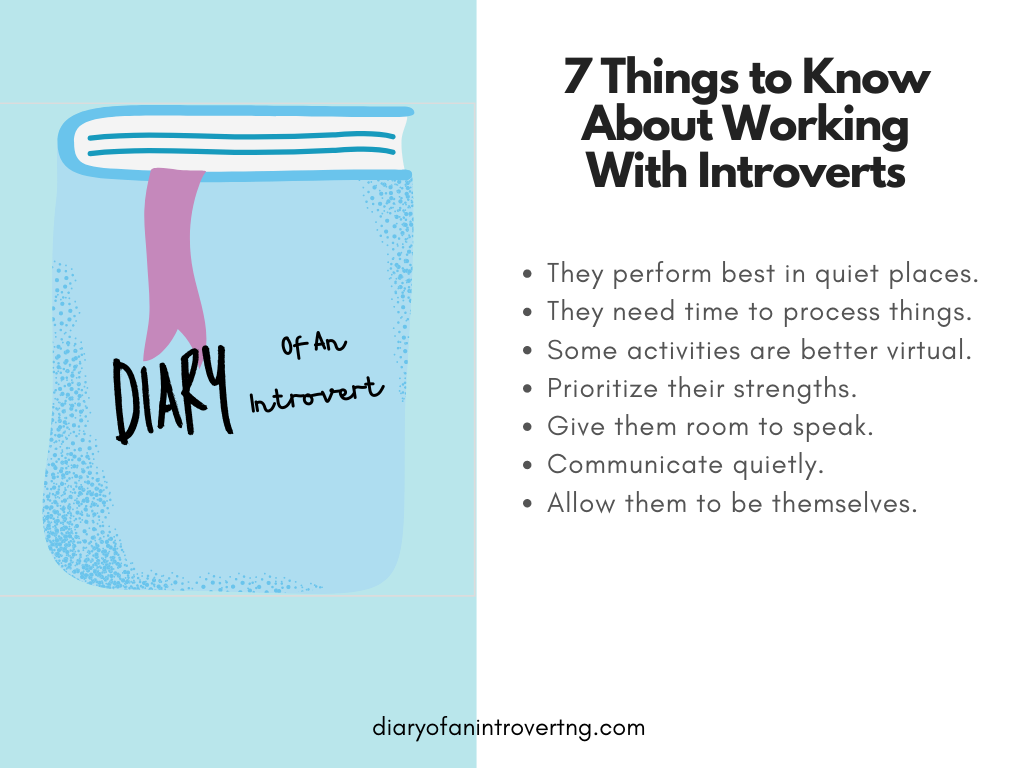Working With Introverts? 7 Interesting Things to Keep in Mind
Photo by Sincerely Media on Unsplash
So, there’s a quiet person on your team - an introvert.
They’re not as outgoing as you want them to be, and you’re wondering if it’s going to affect your work. Even though there’s a big misconception that introversion in the workplace is hard to deal with, we’re here to tell you something different.
Working with introverts is a lovely experience that you’ll cherish in the long run. This is especially true if you can learn to understand how they think and behave. That’s why getting accustomed to the ethics of introvert work will make your time with quiet people more worthwhile.
If you’re keen on relating well with all introverts at your workplace, then this article is for you. We’ll dive into relevant information concerning the introverted personality, and also interesting things to know about them, which will make working with them much easier.
Understanding the Introverted Personality
No, it’s not shyness.
Introverts don’t have a hard time speaking in public (except if they have social anxiety, which some extroverts can have).
Focusing primarily on one’s feelings and thoughts is what the term introverted means. Therefore, the definition of an introvert person is someone whose feelings are directed inwardly.
It’s not a condition that needs to be changed or a social predicament. It just means the person prefers more minimally stimulating environments, because of all the buzz happening on their insides.
When you first come in contact with introverts, your first inclination is that they have a problem. Your next line of action would be to make them come out of their shells.
However, understanding their personalities would help you have a better idea of why quiet people behave the way they do.
Related: The Ultimate Guide to Understanding Introverts (36 Things to Know)
How to Spot an Introvert
You’re in a group meeting, and one person is sitting silently throughout. Chances are, they’re an introvert.
The perfect introvert example is someone that chooses to observe more than they speak. They might also seem like a chatterbox during one-on-one conversations but will be quiet in group settings.
There are different types of introverts, however.
The social introvert meaning is someone who loves social interactions but also prioritizes spending time alone. As such, they might seem more reticent and reserved in crowds but talkative on personal interactions.
But not all introverts are social introverts.
Some introvert might be more quiet until they’re thoroughly comfortable with you. These are the extreme introverts.
Other words for ‘introvert’ are reserved, a thinker, homebody, self-observer, etc. All these terms will help you identify an introvert when you see one.
7 Things to Know About Working With Introverts
They perform best in quiet places.
The environment of an introvert determines how well they function. Common scenarios of an introvert struggling at work may be due to loud sounds, endless chit-chats, or irrelevant small talk. The more an environment is noisy, the more a quiet person would find it difficult to concentrate.
As an introvert, I can relate to this circumstance. If my immediate surroundings are too noisy, I’ll instantly become uncoordinated. This happens because my inner world is already active. So, I need a great deal of external silence to work through my thoughts.
It’s also one of the ways I can get creative. I always have a pool of ideas waiting to be explored, but if something in my environment keeps distracting me, I won’t be able to turn my ideas into something substantial.
Therefore, setting the perfect introvert workplace environment is crucial. As an employer, offering your introverted subordinate a less clamorous part of the office would go a long way. You might also need to consider how your staff is seated and the sitting arrangement of the quieter ones.
If everyone is clustered together, it’ll favor the ones who enjoy plenty of social interactions. However, it might interfere with the productivity of the reserved folks.
More so, co-workers need to be conscious of the more introverted individuals on their team. If you sense that someone on your team prefers to work alone or in a silent environment, give them space to finish their work before interfering.
2. They need time to process things.
Have you ever wondered why some quiet folks would remain quiet even when deliberation is ongoing?
The answer is that their brains tend to process things much longer than other individuals.
It’s not that they have nothing to say, or that they’re shy. An introvert in the workplace
needs a little more time to figure out the best response for each occasion.
For example, if an introvert is asked, “What's the best route to get to a destination?” they'll most likely pause to give the most appropriate answer. They might put many things into consideration like the means of transportation, the person’s preference, and other things.
On the other hand, an extrovert might give a faster response, without considering some of the things an introvert would think about.
Being introverted at work is somewhat similar. Instead of saying their most prominent thoughts, they’d instead process them further.
There’s a science behind why introverts tend to have longer thought patterns than extroverts. The secret lies in the pathways their brains use to send and receive information. More of this is discussed in this book.
Therefore, when you see an introvert quiet in a meeting, avoid putting them on the spot. If you want to get the best of their creative and insightful personalities, you have to give them time to process everything they’ve heard.
Consider asking for feedback after the meeting or when you think they’ve appropriately thought things through. This method will further prevent common introvert struggles at work.
3. Some activities are better virtual.
Social activities lead to more mental stimulation, which is what the extrovert likes. However, an introvert undoubtedly requires more alone time to function at their best.
Therefore, having a balance of virtual and in-person activities is necessary to have a stable workforce.
It’s essential to ask yourself, “Do I really need to hold a meeting for this? Or can I send an email to communicate the message?”
If things can be done effectively in a virtual space, don’t try to do them in person. If the pandemic has taught us anything, it’s that work can be done from anywhere.
Introverts at workplace appreciate fewer physical meetings because it gives them ample time to recharge and perform well at any task. Likewise, you don’t have to make certain events compulsory for people to socialize.
At the end of the day, these little actions will contribute to the effective introverted work that happens around the office.
Even more so, if you’re planning an office party, picking a conducive location for all personality types is necessary. Most quiet people wouldn’t want to go to a bar but they might be happy attending a picnic in a park.
Any introvert in workplace doesn’t want to be forced into uncomfortable activities. You need to understand their personalities before making a request. And if they decline your requests, understand that their social batteries aren’t the same as the outgoing folks.
As an introvert, I want to hang out and have a good time, but it has to be at the right time, in the right place, and with the right people, or I’ll get drained quickly.
Related: Am I Too Quiet? P.S. No, You’re Not. A How-To Guide to Using Your Introversion to Your Advantage
Liking this article? Join our Introvert Club→
4. Prioritize their strengths.
Introverts have a variety of amazing qualities, including being thought-provoking, insightful, great listeners, incredible observers, and many others.
However, you may not vividly see all these traits, except in the right environment.
If you have someone introverted at work, you need to focus on bringing out their strengths by putting them in conducive environments.
I know that life isn’t a bed of roses, and introverts can’t expect to have everything they desire. But, if a quiet person exhibits signs that they perform better in a particular setting, you should prioritize that for more productivity.
It's critical to avoid situations that put your introverted teammates or quiet employees under undue pressure to deliver, especially in environments that work against their personalities.
While other people may function effortlessly in some situations, you'd be surprised at how much introverts can accomplish in the ideal environment.
For example, if you’re working on a design project, some of your colleagues or teammates might prefer brainstorming together. Although this is quite essential, it shouldn’t be the only medium to spark creativity.
For the quieter folks, it would be helpful to allow them to embrace solitude for more insight into the project. Prioritizing their strengths this way will ensure you get a well-rounded spectrum of ideas.
Even though you might want things done in a certain way, being flexible with each personality type will ensure you get excellent results.
If you’re not sure of the strengths reserved people have, and how to work with them, reading the introvert’s blog article below will give you enough knowledge.
Related: 12 Delightful Benefits of Being an Introvert in Today’s World
5. Give them room to speak.
Extroverts tend to dominate most conversations because of how fast their brains process information.
This process is quite different for introverts because their brains process things through a different and much longer pathway called the acetylcholine pathway.
That means that I could have inspiration on a subject that I want to share, but it’ll take my mind some time to process everything.
An introvert’s mind naturally wants to communicate in the best possible way. They wouldn’t want to say anything they regret, or can’t own up to.
So if you have an introvert on your team, making them comfortable enough to process their thoughts is necessary. Don’t take too much meaning from their silence. If they don’t have a response when you need one, it doesn’t mean they’re uninterested or lack creativity. They just need time to absorb and process enough information to give a worthy response.
Introverts in the workplace want their opinions to be acknowledged, and they won’t do this by forcing you to accept them. They’ll only showcase the best of their personalities when they feel welcome.
If you’re working on a project, let the introvert share their feedback at a comfortable pace. Don’t put them under pressure if it’s not necessary. Likewise, don’t assume they have nothing to say and override their suggestions.
This step will also endear them to you. They’ll be more willing to share their creative sides with you even when you don’t ask.
Giving people room to be themselves lets an introvert define the best way to communicate freely with you.
6. Communicate quietly.
Interpersonal relationships are critical for working with introverts. Not every introvert is the same, and you need to know them personally to understand how to relate to them.
For example, when I was working with a much more extroverted individual, he presumed my quiet nature meant I had nothing to say and only contacted me when he wanted to assign a new task.
This made working with him burdensome as he was always demanding something, without bothering to ask about my preferences.
You can’t form a friendship with every quiet person you’re working with, but it’s crucial to be on the same page with them.
So what exactly does it mean to communicate quietly? It’s realizing that an introvert isn’t wired the same way as you are, and actively learning the best way to interact with them.
Asking questions will help you know how to relate with introverts in workplace. Learning how to talk to introvert people is also a necessary skill extroverts should learn.
Related: How to Talk to an Introvert in 15 Perfect Steps (for Extroverts)
You don’t have to go out of your way to communicate with an introvert. You just have to be down-to-earth and sensitive about your interactions with them.
Try not to dominate all the conversations. Even if they aren’t speaking up, give them room to air their thoughts.
Also, know that introverts are great observers and would know if you’re pretending to gain their affection.
So, be genuine and intentional when relating with them. Trust me, it’s not as hard as it sounds. Just generate pure interest in their ethics and you’ll find yourself having a blossoming relationship with them at the office or workplace.
7. Allow them to be themselves.
Being an introvert at work isn’t as easy as we’d like. We behave so much differently than others that we often wonder how to not be an introvert.
For example, I might not greet my coworkers in the morning or socialize like everyone expects me to. This can come off as rude because I’m simply trying to get into my element for the day.
This happens especially if I've had a busy morning without any time to sort out my emotions.
Without alone time, I feel too clogged up to process more information coming in. I can't function at my best and would prefer not to engage with anyone.
Another thing is that I might be too aloof for my coworkers' liking. When they’re sharing an exciting event that happened in their lives, or perhaps a negative one, I'd take too much time processing the information. This scenario can be particularly annoying to extroverts who want immediate social responses.
It might be hard for me to associate the way, my coworkers, like because of how mentally taxing it might be for me. If there are already a lot of things to think about, I can't give appropriate feedback at that moment.
These are just a few of the behaviors I might showcase that would infuriate an extrovert enough not to want to interact with me. However, understanding that these behaviors are common with quiet people will help you allow us to be ourselves when the need arises.
We aren’t always isolated and can be quite talkative when you get to know us. But, if you don’t give us the benefit of the doubt on our bad days, you won't enjoy the positives attached to our temperaments.
FAQs
What’s the definition of introvert?
An introvert is a person who prefers minimally-stimulating environments and prioritizes alone time more than group gatherings. Another word for introverted is a reserved or reticent person. You’ll naturally focus inwardly and be prone to observing that talking spontaneously.
Why are people introverts?
Many factors determine a person’s personality such as their genes and environmental factors. Therefore, being introverted is absolutely normal. People are introverted because that’s the way they were born. For others, their personality might have developed that way over some time.
Is it okay to be an introvert?
Many people want to know, “Is it okay to be introverted?” The answer is yes. In the same way that extroverts have their strengths, introverts have theirs too. Knowing what makes you special will help you build your self-confidence as a quiet person.
Why do extroverts like introverts?
Extroverts tend to like introverts because we’re great conversationalists (said with bragging rights). We enjoy having deep talks which makes us pretty insightful. More so, we’ll be our authentic selves around you and stay far away from superficial talks and impressions.
How to know if you're an introvert?
You’ll know if you’re an introvert if you enjoy your alone time and prioritize it more than going out for social events. There are other ways to tell if you’re an introvert. Reading articles from this introvert blog can give you enough insight into your personality type.
Related: The Introvert Meaning: See 26 Fascinating Signs You’re An Introvert
Final Thoughts
Did you enjoy this article? Working with introverts isn’t as complex as it seems. You just need to understand their temperaments and make efforts to interact with them better. Subscribe to this introversion blog to understand the introvert personality better. If you liked this article, kindly leave a comment below or share this article with whoever needs to see it.
Get the Am I Too Quiet? book →














